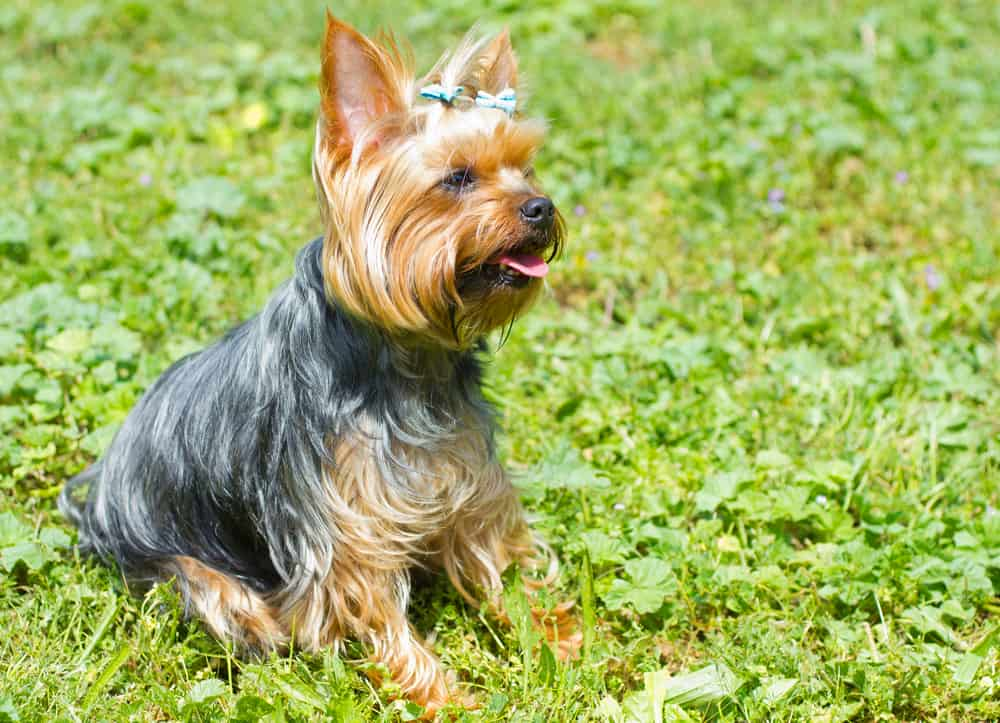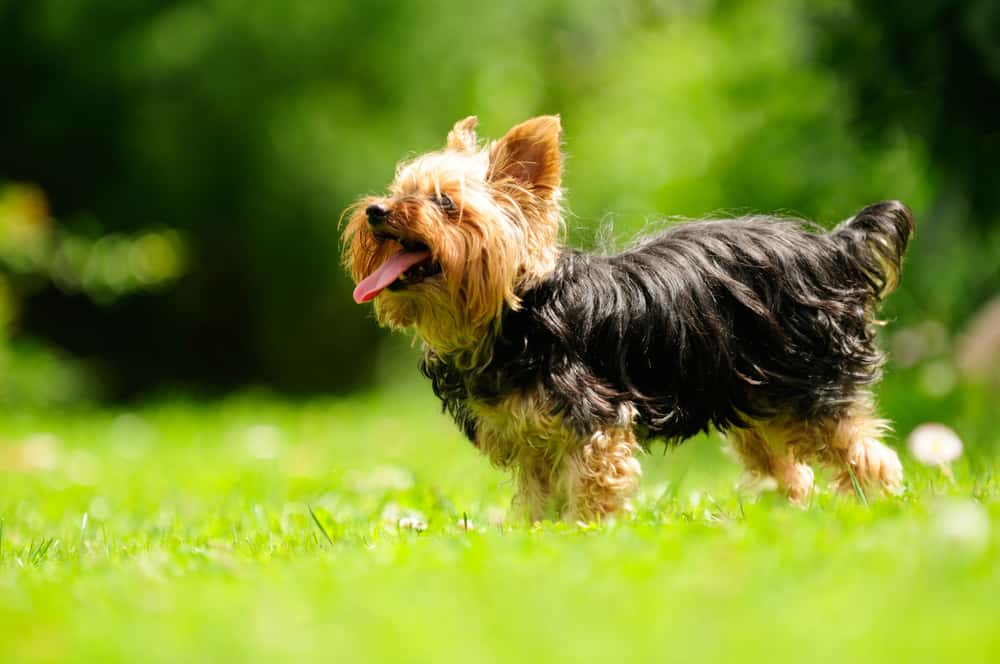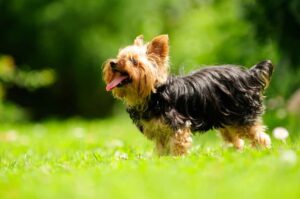Paris, France
The Yorkshire Terrier, also known as the Yorke, is a small breed of dog that was developed in the county of Yorkshire, England, in the 19th century. With its lively and playful personality, elegant appearance and compact size, the Yorkshire Terrier has long been one of the most popular companion dogs around the world.
In this article, we'll explore the history and unique characteristics of this beloved dog breed, as well as the care and maintenance needed to keep your Yorke healthy and happy. Whether you are a passionate Yorkshire owner or simply curious about this charming breed, we are delighted to take you into the fascinating world of Yorkes.
How much does a Yorkshire Terrier weigh?
At first glance, an adult Yorkshire Terrier can weigh between 1.5 and 3 kg. The weight may vary depending on various parameters such as the size, age and sex of the animal. Males often tend to be a little heavier than females.
Yorkshires typically reach their adult weight between 6 and 8 months of age. Some may continue to gain weight until age 1. It is necessary to monitor your Yorkshire's weight and feed him a balanced diet to maintain his health and well-being.
| Age | Average weight (Kg) |
|---|---|
| 2 months | 0.5 to 0.7 |
| 4 months | 1 to 1.4 |
| 6 months | 1.5 to 2 |
| 8 months | 1.9 to 2.5 |
| 12 months | 2.3 to 3 |
Characteristics of the Yorkshire Terrier
THE Yorkshire Terrier is a small dog breed with a unique character and distinctive appearance. Here are some of the most notable characteristics of this breed:
- Tappearance and appearance : Yorkshires are small dogs, usually weighing between 2 and 3 kg. They have a small, round head with sparkling eyes and an alert expression. Their coat is long and silky, usually steel blue in color on the back and top of the head, with a more golden hue on the belly, legs and head.
- Ppersonality : Yorkes are usually described as being stubborn and independent, but they are also very affectionate and loyal to their owners. They tend to be very protective of their territory and may bark to alert their owners of any potential danger.
- Intelligence : Yorkes are a very intelligent dog breed, which makes them easily trainable. They are also known for their curiosity and desire to discover new things.
And finally, the need exercise : As a companion dog, Yorkes need moderate exercise, such as daily walks or playing in the yard. However, due to their small size, they can easily adapt to apartment living.
| Breed Characteristics | |
|---|---|
| Midsized | 15 to 17 cm |
| Average weight | 2 to 3 kg |
| Needs | can live in an apartment / short walk |
| Life expectancy | 13 to 16 years old |
What are the most common health problems in Yorkshire?
Yorkes are generally healthy but, like all dog breeds, they are prone to certain health problems. These problems can include dental problems, allergies and respiratory problems.
Although the Yorkshire Terrier is usually a healthy dog breed, they are prone to some common health problems:
- Dental problems : Yorkes often have dental problems, including tartar buildup and tooth loss. Owners should therefore ensure that their dog receives good dental hygiene, including regular tooth brushing.
- Skin Allergies : Yorkes are also prone to skin allergies, which can be caused by allergens such as dust, pollen, or flea bites. Symptoms may include itching, redness and hair loss.
- Breathing problems : Due to their small size, Yorkes can have respiratory problems such as tracheobronchitis, also known as "kennel cough."
- Liver diseases : Yorkes are also prone to liver diseases, including portosystemic shunt, which is a congenital malformation of the blood vessels of the liver.
What health problems can appear with age?
As Yorkes age, like other breeds, they can suffer from patellar luxation, a condition in which the kneecap moves out of its normal position, and also from cataracts.
It is for these reasons that you should carefully monitor your dog for any signs of health problems and consult a veterinarian if necessary. Regular vet visits and a healthy diet can help maintain your Yorkshire Terrier's health and prevent many health problems.
How to maintain the Yorkshire Terrier's coat?

Certainly, the Yorkshire Terrier's silky, long coat is one of its most distinctive features, but it requires regular grooming to stay healthy and avoid matting and tangling.
Here are some tips for maintaining your Yorkshire Terrier’s coat:
- Regular brushing : Brush your Yorkshire every day with a soft brush to remove tangles and dead hair. Be sure to brush gently to avoid damaging the delicate coat.
- Regular bath : Yorkshires need regular bathing to keep their coat clean and healthy. Use a mild shampoo specifically designed for dogs to avoid irritating their sensitive skin.
- Gentle drying : After bathing, wrap your Yorke in a soft towel to remove excess water. Avoid using a hairdryer as this can dry out their skin and damage their coat.
- Regular fit : If you don't want your Yorkshire's coat to be too long, you can have it trimmed regularly by a groomer. It can also help prevent knots and tangles.
- Care of hair around eyes and ears : Hair around the eyes and ears can become matted and cause irritation. Use sharp scissors to gently trim the hair around the eyes and clean the ears with a mild ear cleaner.
In case you have any questions or concerns about caring for your dog's coat, do not hesitate to consult your groomer or veterinarian

How to train your Yorkshire Terrier?
Training the Yorkshire Terrier may seem difficult due to their small size and stubborn temperament, but with patience and consistency, you can train your dog successfully.
Here are some tips for training your Yorkshire Terrier:
- Define clear rules : Establish clear rules from the start, including where your dog can go in the house, meal times, and outing times. Make sure everyone in the family knows these rules and follows them consistently.
- Use positive reward : Yorkes are very sensitive to positive reward. Use treats, petting, or praise to reward your dog when he behaves well and follows the rules.
- Avoiding physical punishment : Avoid physically punishing your Yorke, as this can cause behavioral and self-confidence problems. Instead, opt for positive reinforcement methods.
- Potty training : Potty training is an important part of raising your Yorke. Establish a regular routine for going outside, reward your dog when he does his business outside and don't punish him if he has an accident inside.
- Socialization : Socialization is essential for Yorkes to help them adjust to other dogs and people. Take your dog on walks and meet other dogs and people, and expose him to different situations and environments.
In summary, theYorkshire Terrier education requires patience, consistency and positive reinforcement techniques. With love and patience, you can successfully train your dog and develop a strong, harmonious relationship
To conclude
The Yorkshire Terrier is a charming and popular dog breed thanks to its stylish appearance, bold personality, and compact size. Yorkshires make excellent pets for those looking for an affectionate, intelligent, and easily adaptable small dog.


